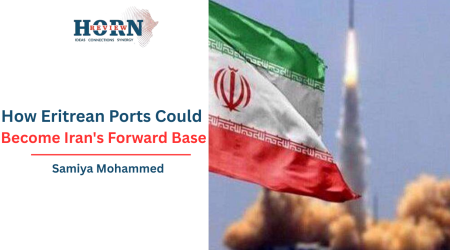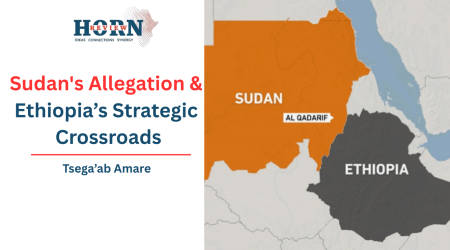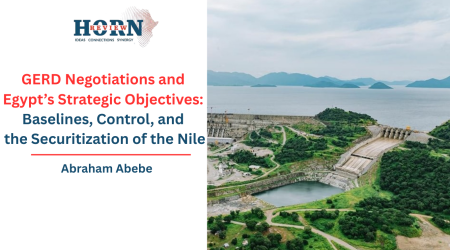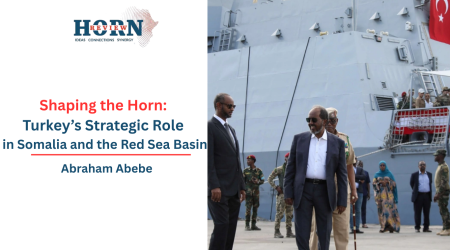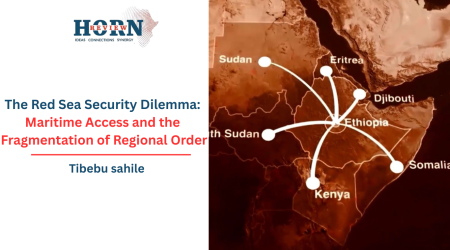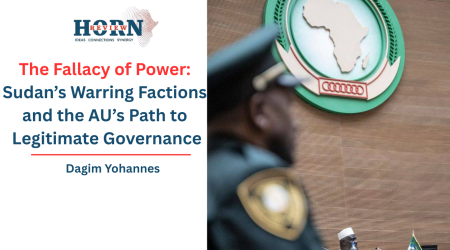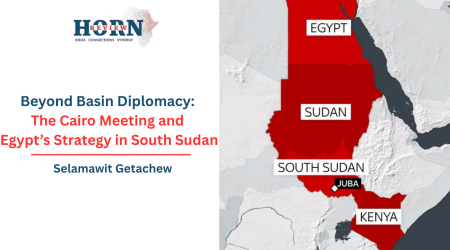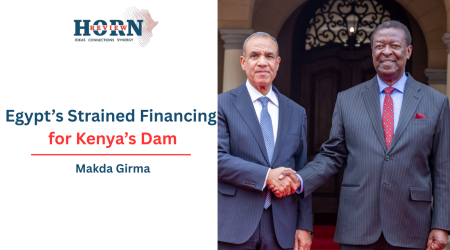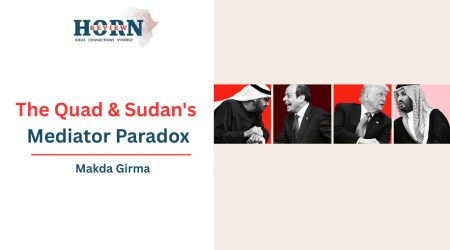
30
Jul
Siege from the shore: Egypt, Somalia, and Ethiopia’s maritime standoff in the Red sea
Egypt’s military and diplomatic recalibration towards Somalia goes beyond a routine foreign policy change. It also marks a significant reorientation of its Red Sea security approach. Egypt and Somalia formalized a strategic partnership in January 2025. Cairo’s ultimate goal was vivid, increasing Egyptian influence in the region that is becoming essential to Ethiopia’s maritime interests and broader strategic concerns, despite the official statement’s emphasis on security approach, economic integration and cultural exchange.
The shift reflects Egypt’s response to a quickly shifting regional landscape. Egypt has been forced to look for new leverage due to the instability in Sudan, Ethiopian’s rising port ambition, and the emergence of powerful external actors like China, Turkey and UAE. Once too fragmented to provide a reliable partnership, Somalia now offers a rare chance. Its vast coastline makes it a key player in the Red Sea coast and its federal government appears to be more stable. By establishing itself militarily and diplomatically in Somalia, Egypt is positioning itself as an important maritime stakeholder and a potential gatekeeper to Ethiopia’s future as a sea power.
Egypt has a clear stance: Somalia provides a double strategic advantage. It is close to Ethiopia’s southeastern border and reinforces the status quo around Somali sovereignty, particularly in light of Ethiopia’s controversial Memorandum of Understanding (MoU) with Somaliland. This alignment’s multiple functions, as a diplomatic tool, a military deterrent and a challenge to Ethiopia’s claims of regional leadership, making it powerful. In an effort to counter what they see as Ethiopia’s claims to maritime authority: Egyptian officials are increasingly presenting their Red Sea presence as a crucial component of a broader Arab maritime security plan. Cairo’s more subdued but noteworthy interactions with Eritrea besides Somalia, further strengthen the perception of encircling Ethiopia from both sides.
Egypt’s involvement in Somalia is swiftly moving beyond intelligence sharing and training operations. Tactical cooperation is deepening, with Egyptian military advisors reportedly incorporating in Somali planning against Al-Shabaab and actively supporting the development of logistical infrastructure close to vital coastal locations. While these actions aim to enhance regional security, their timing and direction strongly point to a longer-term goal: an attempt to prepare Egypt for potential maritime conflicts or to greatly sway the future port access negotiation in Mogadishu’s favor.
Ethiopia’s Tightrope: Between Maritime Aspiration and Encirclement
Ethiopia has received a clear message from Egypt’s pivot: the sea route is now undeniably contested territory and cannot be negotiated unilaterally. Egypt’s support for Somalia directly contradicts Ethiopia’s recent push for port access in Somaliland, which Ethiopia has framed as both an economic priority and a sovereign need. The essential corridor is currently at risk of becoming a geopolitical minefield, complicated by Egyptian-Somalia calculation, rivalry in the Gulf and growing regional worries about precedent and global recognition.
Ethiopia is under pressure from this strategic realignment on three important levels. Strategically, it undermines Ethiopia’s ability to secure dependable access to the Red Sea while facing multiple forms of resistance including diplomatic, legal and possibly military. Politically speaking, it raises the stakes for engagement with Somaliland, because Somalia, emboldened by Egyptian backing, might use strong pan-Somali narratives to amplify opposition.
Domestically, it runs the risk of igniting long-suppressed ethnic tensions, especially in Ethiopia’s Somalia Regional State, where national identity is subject to change and outside influence
Addis Ababa has responded cautiously in public. The Ankara declaration, facilitated by Turkey in 2024, provided a short-term solution to the Ethiopia-Somalia conflict. However, this truce has not reversed Egypt’s structural integration onto Somalia’s defense and governance. Egypt’s increasing influence in Somalia has already alarmed Ethiopia’s military leadership, perceiving it as a potential encirclement. The idea that ad hoc diplomatic efforts are no longer adequate is becoming more widely accepted within the organization. The nature of the Red Sea challenge has evolved: it requires a comprehensive and decisive doctrine.
Beyond the immediate issues, this situation extends beyond immediate concerns. Egypt’s effective institutionalization of its presence on Somalia may result in Arab-led counterbalance to the current African Union (AU) maritime frameworks, potentially drawing Somalia closer to Arab league security arrangements and luring it away from broader attempts at African consensus. This division would weaken regional collaboration and lessen Ethiopia’s influence in major maritime governance discussions. Meanwhile, external actors like the UAE and Turkey, who are already well-established in Somali infrastructure, may exploit this rivalry to enhance their own influence, further restricting African agency and autonomy as a whole.
Ethiopia’s Future Moves: Strategic Scenarios and Regional Vision
Ethiopia can neither afford to drift strategically nor respond to this containment with confrontation. The Red Sea is currently operational theatre, not just ideal; it has become a critical area of operation, and Addis Ababa needs to act decisively. This requires a bold, progressive strategy founded on accurate evaluations and distinct institutional guidance
In a proactive scenario, Ethiopia takes the lead in vigorous maritime diplomacy initiative rather than a focus on direct maritime access. It could propose and direct a multilateral forum with Djibouti, Kenya and Somalia under the shadow of the African Union. The forum would aim to create a common maritime code of conduct for the whole Red Sea-Gulf of Aden corridor.
Naval de-escalation procedures, trade compatibility and port security could be major areas of emphasis. By taking this initiative, Ethiopia would position itself as a cooperative maritime actor rather than a unilateral claimant. If Egypt opposes inclusive, Africa-led frameworks, this move would diplomatically isolate Egypt and might not provide immediate port access.
Ethiopia could improve its relationship with Somaliland by implementing a more sophisticated and nuanced strategy. Instead of focusing solely on direct defense agreement, Ethiopia could pursue a long-term economic integration plan that is closely tied to broader Somalia reconciliation initiatives.
This approach would entail significant infrastructure investments, such as rail connection, cross-border energy projects and shared custom systems. These projects would be implemented once trilateral discussions involving Ethiopia, Somali Federal Government and Somaliland take place. This strategy softens oppositions without completely abandoning Ethiopia’s main access goals by preserving Ethiopia’s port access agenda while giving Somalia a viable path towards engagement.
Lastly, Ethiopia could firmly institutionalize its maritime ambitions by creating a dedicated Red Sea Strategic Command particularly for this purpose. Defense, foreign policy, intelligence, and logistics would all be seamlessly integrated into this all-encompassing national security unit.
This body would be responsible for developing unified threat assessments, managing a planned naval buildup, and coordinating all foreign relations. Most importantly, it would lead Ethiopia’s participation in the AU’s AIMS 2050 framework (Africa’s Integrated Maritime Strategy), enhancing Ethiopia’s regional legitimacy and ensuring policy alignment.
The Way Ahead: Stewardship, Not Just Access
There are particular trade-offs in each of these scenarios that need to be carefully evaluated. However, the core principles are still the same: Ethiopia’s actions should be framed around the broader idea of regional stewardship rather than focusing solely on obtaining access to the sea. Geography offers an inherent advantage only if it is carefully operationalized through cohesive and decisive policy. Inaction risks encirclement, while overreacting could lead to wider regional destabilization.
Ethiopia’s large population, growing economic potential and substantial diplomatic position as the host of the African Union uniquely allow it to influence the future course of the Red Sea. However, influence must be earned via strategic foresight and cooperative actions, not just assumed. Ethiopia faces a significant challenge due to Egypt’s shift to Somalia. It forces Ethiopia to clearly define its maritime identity through effective coordination, unwavering commitment to continental responsibility, and clear vision rather than through confrontation.
The nations with the strongest institutions, flexible strategies and credible long-term visions will ultimately prevail in the protracted arc of Red Sea geopolitics, not those who make the loudest claims. Ethiopia is at a pivotal strategic juncture. It can either passively respond to the pivot taking place around it or actively shapes its future. The stakes are immediate, coastal and fundamentally national.
By Bezawit Eshetu, Researcher, Horn Review
References
- “Egypt and Somalia Forge Strategic Partnership to foster Growth and Stability.” Middle East observer, January 27, 2025
- International Crisis Group. (2024). “Ethiopia’s push for sea access.”
- Reuters. (2025). “Egypt boosts military presence in Somalia to counter Ethiopia”
- Khaliaf, Abdirham. “Somalia Rejects Ethiopia’s Request to Join Naval Exercise, Cities Sovereignty and Legal Concerns. “The Eastleigh Voice, July 21, 2025.
- M. Yahia. “Geopolitical chess in the Horn: Egypt’s Long Game. Middle East institute”, 2023.
- Vertin, Zach. “Red Sea Rivalries: The Gulf, the Horn and the New Geopolitics of Red Sea. “Brookings Institutions, August 8, 2019.

